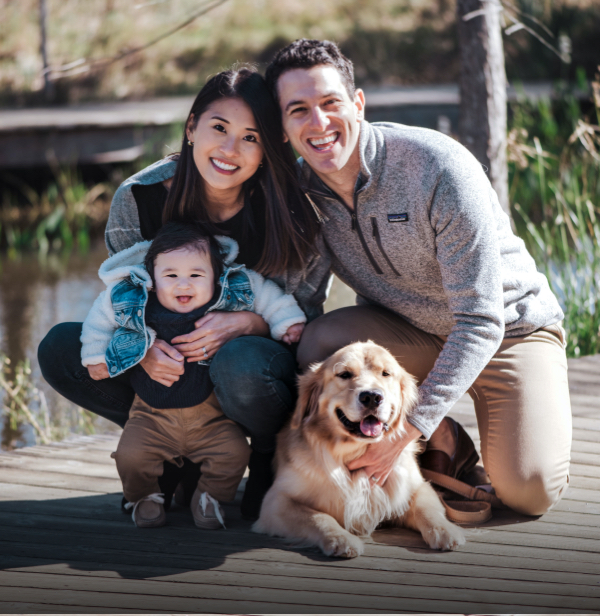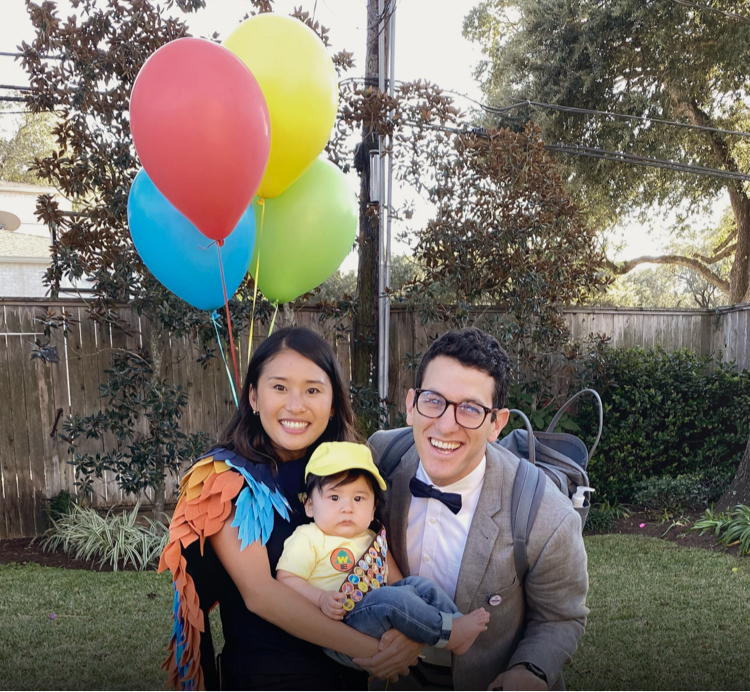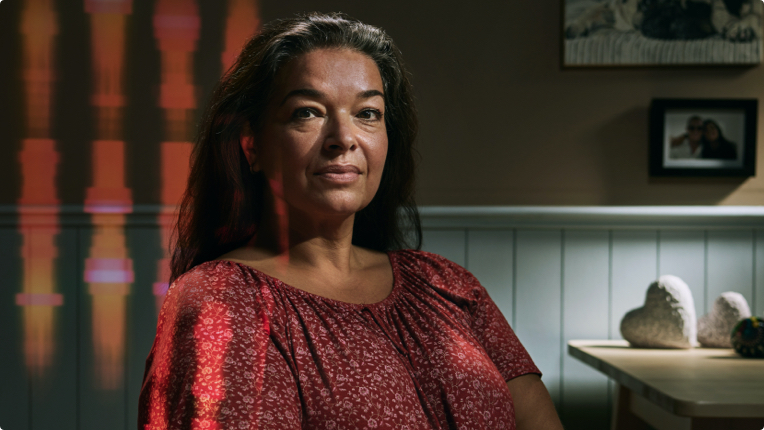Genetic ALS:
a personal journey and a life’s mission
Home / A profile of ALS
A journey of discovery
Daniel Barvin is a young man, a devoted husband, and a loving father. He is also a carrier of a C9orf72 repeat expansion mutation associated with ALS. Daniel’s journey to this discovery—and his family’s journey with ALS—has been a long one. Now he uses everything he has learned to help inform his journey forward, including his advocacy work with individuals and families grappling with genetic ALS.
Daniel tells his story in this article, including his own challenges with genetic ALS and his hope for what genetic testing may offer families affected by the disease.
Daniel Barvin has been compensated by Biogen for this article.


My family’s first experience with genetic ALS
My family’s long journey with ALS began when I was 10 years old. That’s when my uncle Bill was diagnosed with bulbar-onset ALS, a form of the disease that leads to difficulty speaking and swallowing. At the time, I had no idea that this was an especially rare form of ALS. I barely even knew what ALS was, let alone the effect it could have on a person—or an entire family.
Sadly, my uncle would only live for another 2 years following his ALS diagnosis. Watching the incredible toll ALS took on him was devastating. But it was just as difficult to see the effect it had on his wife, my aunt Lynn. That was a lot for a 10-year-old to take in.
At the time, my uncle’s ALS was labeled as a sporadic case, which is the word used to describe ALS in people who don’t have a known family history of the disease. To our knowledge, there had been no one else in our family with ALS. So while my uncle’s passing was a terribly sad moment that we knew even then would change our lives forever, we thought our experience with ALS had come to an end. We had no reason to think it was only the beginning.
ALS again?
It was 10 years after my uncle passed away when my aunt Paula—my late uncle’s sister—was diagnosed with ALS.
Hers was the form of the disease that begins in the limbs, which I would come to learn is more common than the type of ALS my uncle dealt with. But, for the second time in my young life, I found myself shocked, confused, and saddened by this disease I still didn’t quite understand. This was when I realized that ALS had a recurring presence in my family.
Searching for the connection
My aunt Paula passed away 2 years after she was diagnosed. We decided as a family to explore the idea of a connection between the two cases. But none of the doctors we talked to could verify that one existed. Strange as it might seem today, none of them even brought up the idea that genetics might play a role in ALS. We’d soon find more reason to suspect that they could, in the form of yet another family tragedy.
While we were searching for a connection between the ALS cases in my family, and still reeling from Paula’s death, we were also struggling to cope with my father’s cognitive decline. I’d always looked up to my father and we had a wonderful relationship. When I was about 15 and he was 45, he began to show signs of early-onset frontotemporal dementia, or FTD. FTD is a disease in the brain that causes mental deterioration and behavior changes that get worse over time. Those kinds of changes can lead to a lack of connection between people—even people who have loved each other all of their lives. My father became, at times, difficult to deal with. There were moments when I couldn’t recognize him and his disease created a rift between us.
As my father’s condition worsened, my family was desperately trying to understand his illness. He spent 7 months in the hospital after losing most of his cognitive function. During this time, despite the input of his doctors, no one could figure out what was wrong. He passed away at just 60 years old.
I decided then that I needed to learn as much as I could about the diseases impacting my family. I felt there had to be a connection between the ALS that robbed us of our uncle and aunt, and the FTD that took my father. I felt like it was too big a coincidence for there not to be any connection. I came to the conclusion that if I could understand that connection better, maybe I could find a way to help my family—and other families dealing with the same thing. I had found my mission.
Connection made
During my father’s autopsy, a genetic test revealed that he had carried a mutation in something called the C9orf72 gene. It turned out that this mutation is associated not only with FTD, but with ALS as well. In fact, we now know it is the most common genetic cause of both conditions.
Through genetic testing, we were able to identify the genetic mutation associated with my father's condition, and discover that it may have also been a factor in my aunt's and uncle's conditions. Finally, we had an answer. But now it opened up a whole new world of questions. While this news went a long way toward explaining our past, it could also have serious implications for our future. We learned that there was a 50% chance my father had passed the mutation on to me. It was shocking and more than a little terrifying but, on the other hand, it also gave us information to help us make informed decisions.
When we learned this, I was young and healthy and had just been married 6 months earlier. No one looking at me from the outside could have known the gravity of what my family and I had just discovered—that a gene mutation associated with ALS and FTD ran in my family, and that my father could have passed the same mutation on to me.
I had spent so much time watching my mother care for my father. Now I thought of my own wife. Would she eventually have to care for me the same way?
Moving forward as a family
Each member of my family had their own unique reaction to the news about the C9orf72 mutation. Some of us immediately wanted to receive genetic testing, to find out as much about our own situation as possible. Others wanted simply to move on with their lives. We each took a different path, processing information in different ways and at varying speeds depending on our personal situations and stages in life.
Thinking back to my family’s experience, those who lived with and died from ALS and FTD were blindsided by their disease. They had no idea it was coming, and when it hit them, they—and those around them—were not prepared. I wanted to know my status so that I could make decisions based on the knowledge I would gain from the test. I want to be informed. I made the best decision for me and I recognize that others need to decide what's best for them.
The concerns I had around testing were primarily about what it would all mean for my wife. How would it affect our lives together? She found it hard at first to think about the future, and what it might mean for us if it turned out I also had the mutation. But communication—sharing our worries and fears as well as our hopes—was essential. She was in my corner when we decided I would undergo genetic testing. And she was in the room with me when I discovered that I, too, carry the C9orf72 mutation. I was 28 years old when I got the news.


Daniel, his wife, and their son
My brother put us in contact with a genetic counselor so we could learn more about my genetic status. Of course, knowing my mutation does not make the mutation go away. But having this knowledge was important to me.
The decision whether or not to undergo genetic testing is a personal one, and anyone considering it should do what is right for them. One potential benefit of testing, in my mind, is the chance to contribute to genetic ALS research. Certain clinical trials are open to people with specific genetic mutations—mutations which can be identified through genetic testing.
It’s still my mission to help families living with genetic ALS. I believe step one of that mission is to simply tell my story: how my family and I went from uncertainty, to knowledge. But I know this goes far beyond me. When I was a kid, there were so few resources for my family and me, so few places for us to turn. My goal now is to work to create a real community—and spread real knowledge—for other families affected by genetic ALS.
Genetic testing can provide important information about your ALS.
Talk to your doctor about testing today.






